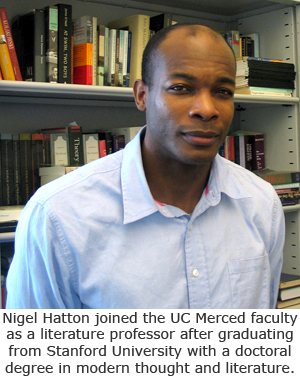

Just after graduating college in 1995, Nigel Hatton showed up for the first day of his journalism internship with the Richmond Times-Dispatch in Virginia. That afternoon, he was assigned to go with a couple more seasoned reporters to an execution.
The shock of going to the execution contrasted with the happiness of graduating college and left him speechless. He felt there was no way someone could get across the injustice and inhumanity of executions.
The experience set him on the long path of combining two of his passions — human rights and literature.
Hatton joined UC Merced as a literatureprofessor last year after graduating from Stanford University with a doctoral degree in modern thought and literature and the humanities. Hatton studies human rights in literature, asking the same kinds of questions explored by professors in the political and social sciences.
Literature has the ability to create a narrative out of a human rights struggle and create a discussion around it, Hatton said. It forces a character to confront what's happening — such as unimaginable atrocities — and takes the reader along on the journey.
Last summer, Hatton watched parts of the trial of Charles Taylor, the former president of Liberia who was tried for war crimes in the Sierra Leone Civil War. During the proceedings, Hatton noticed how the arguments of prosecutors and defense attorneys employed fiction's tools through the trial to create a narrative.
“Novels can arch toward expressing the inexpressible,” Hatton said.
After earning his bachelor's degree, Hatton received a Master of Fine Arts in writing from the University of San Francisco in 2001, a master's in journalism and a master's in Latin American Studies from UC Berkeley in 2005, and a master's in modern thought and literature from Stanford in 2006.
Hatton, who worked at The Sacramento Bee in 1997, also teaches journalism to inmates at San Quentin State Prison as part of the Prison University Project. He is in the midst of turning his dissertation — “A Novel Idea: Global Human Rights and American Literature After World War II” — into a book.
He decided to take a position with UC Merced because of the university's commitment to serving the San Joaquin Valley and using research to help address its problems.
“The university is literally in a place where it cannot ignore some of these issues,” Hatton said. “I am a firm believer in what the university is about, and I'd like to continue what (the founders) have built.”






